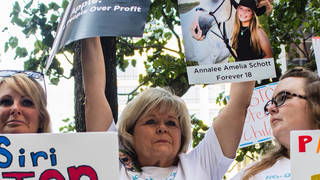
The Supreme Court appears ready to strike down Section 2 of the 1965 Voting Rights Act, threatening the equal representation of Black voters, and potentially greenlighting Republican gerrymandering ahead of the 2026 midterm election. The case concerns Louisiana’s six congressional districts, two of which are majority-Black, in approximate proportion to the Black population of the state. A previous map that gave Black voters only one district in which they were a majority was ruled to have violated Section 2 of the Voting Rights Act last year. Now a group of conservative activists have brought the battle to the Supreme Court, challenging Section 2 itself. “The stakes of this case are enormous. This is a case about whether districts that represent all Americans fairly will remain possible in this country,” says ACLU lawyer Megan Keenan, who is part of the legal team defending Louisiana’s current congressional map. “We have a wretched history of racial discrimination in voting in this country,” and “for 40 uninterrupted years, we have applied this rigorous, data-driven test to figure out when discrimination exists and how to stop it. That’s the test that’s at stake in this case.”
Transcript
AMY GOODMAN: This is Democracy Now!, The War and Peace Report. I’m Amy Goodman, with Nermeen Shaikh.
NERMEEN SHAIKH: On Wednesday, the Supreme Court appeared ready to further weaken the Voting Rights Act by striking down a key provision meant to ensure equal representation for Black voters. The case was brought by a group of self-described non-African American voters who argue Louisiana’s 2024 congressional map is unconstitutional because it includes an additional majority-Black district, which was meant to remedy a likely violation of the Voting Rights Act.
The court’s six conservative judges expressed skepticism that Section 2 of the Voting Rights Act should be allowed to continue. Section 2 outlaws the creation of electoral districts that dilute minority groups’ voting power. This is Justice Brett Kavanaugh.
JUSTICE BRETT KAVANAUGH: The issue, as you know, is that this court’s cases, in a variety of contexts, have said that race-based remedies are permissible for a period of time, sometimes for a long period of time, decades in some cases, but that they should not be indefinite and should have an end point.
AMY GOODMAN: The Supreme Court’s ruling in this case could greenlight Republican gerrymandering ahead of the 2026 midterm election.
For more, we go to Washington, D.C., where we’re joined by Megan Keenan, staff attorney at the ACLU Voting Rights Project.
Talk about the significance, Megan, of this case. What exactly does it mean, in a country that even right now most people under 18 are people of color? By the end of the decade, more than half the people under 30 will be people of color. Can you talk about what this means for this country, those who will govern and those who will be governed?
MEGAN KEENAN: Absolutely. The stakes of this case are enormous. This is a case about whether districts that represent all Americans fairly will remain possibly — possible in this country. And I want to be clear that districts in which minority voters have an opportunity to elect candidates of their choice have not come about by accident, and we cannot take them as a given in this country. Those sorts of districts have come about as a direct result of the Voting Rights Act, that we are here to protect in the Callais case before the Supreme Court.
NERMEEN SHAIKH: Megan, if you could explain the 2023 Allen v. Milligan case and its significance to the one that’s now ongoing?
MEGAN KEENAN: Sure. Just two years ago, the Supreme Court considered whether Section 2 of the Voting Rights Act was constitutional and whether it should continue to be used in the way that it has for the last four decades. Unambiguously, the court said, “Yes, it is constitutional, and we are allowed to remedy discrimination in the political process in the way that Congress set out.” Just two years later, a group of voters has asked the court to reconsider that decision. And we think that it shouldn’t and that it should continue to follow the law, just as it did in Allen v. Milligan.
NERMEEN SHAIKH: And could you explain why this reargument has potential implications not just for Louisiana, but across the country?
MEGAN KEENAN: Sure. So, the question in the case that was presented here was whether the use of race to remedy a proven violation of the Voting Rights Act is constitutional. That has implications for the congressional district in Louisiana that we’re defending most directly, but it, of course, reaches much more broadly, to whether we can remedy discrimination both in voting cases across the country and also in other anti-discrimination statutes. We cannot ignore the role that race plays in the system and expect to be able to remedy discrimination at all.
AMY GOODMAN: For people who are watching globally, can you explain what this voting rights case is all about, where it comes from in 1965, why Section 2 is so important, and what the ACLU is arguing?
MEGAN KEENAN: Absolutely. We have a wretched history of racial discrimination in voting in this country that stretches very far back. In 1965, Congress took stock of that history. They looked at how voting discrimination has evolved over time, that it started with literacy tests and grandfather clauses to keep Black folks out of the political process. But once those things were struck down, legislators found new ways to keep Black voters from exercising their full access to the franchise. Taking all of that history in stride, Congress passed a complex, rigorous test to suss out when discrimination is happening in the political process and how to remedy that discrimination.
That test is the Voting Rights Act. And it has continued to retool that, as recently as the '80s. And for 40 uninterrupted years, we have applied this rigorous, data-driven test to figure out when discrimination exists and how to stop it. That's the test that’s at stake in this case.
AMY GOODMAN: And what did the Supreme Court justices, the questioning, indicate to you, from Kavanaugh to Roberts, who has long wanted to gut the Voting Rights Act, across the board?
MEGAN KEENAN: To be sure, they want to make sure that the system is working well and working fairly. But one thing that we at the ACLU took away from the argument was something that Justice Kavanaugh said. He said that there is complete agreement on the court that equal opportunity is still the goal, that ridding the political process of racial discrimination is still the goal. If that’s true, then we know, clear as day, from the record that we built in Louisiana, we have not yet achieved those goals and that the Voting Rights Act is still as necessary as ever.
AMY GOODMAN: So, I just want to comment at the end here that you have this case that could, to say the least, even further dilute the voting power of people of color in this country. And then you have, at the same time, Adelita Grijalva, who was elected by an overwhelmingly Latino population of 700,000 in Arizona, and the speaker of the House is refusing to seat her, so that this population of 700,000 are not even represented in this country in Congress.
Megan Keenan, we want to thank you so much for being with us, staff attorney at the ACLU Voting Rights Project, part of the counsel team for the Robinson interveners in Louisiana v. Callais.













Media Options